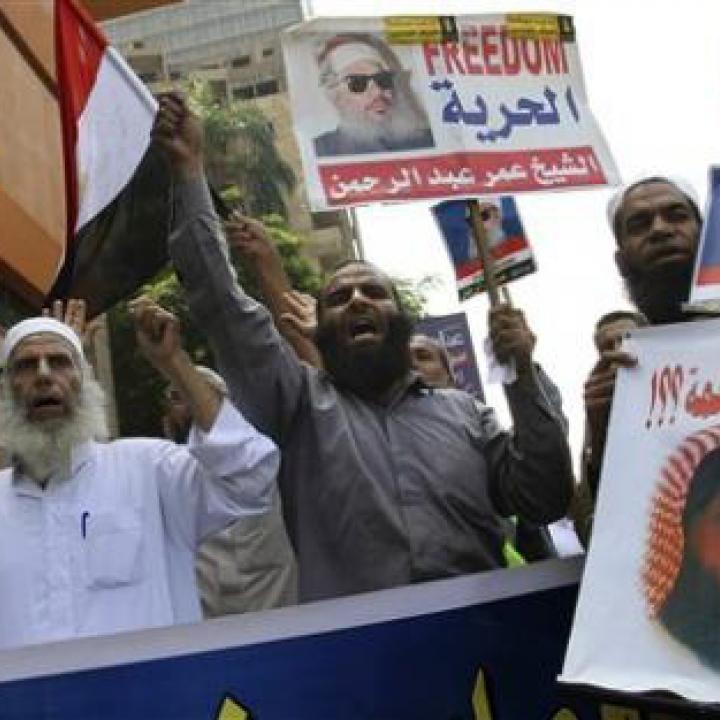
- Policy Analysis
- Articles & Op-Eds
A Visit with a Fundamentalist Member of Egypt's New Parliament

The Salafist view of equality in Egypt is clear: so long as we all live by sharia, we're all equal. Eric Trager reports from Giza.
In Giza's lower-income neighborhood of Talbiya, situated just across the Nile from Cairo, women carry piles of pita on their heads through narrow, dirt-paved roads, squeezing past donkey-pulled carts. Amid the fuel fumes, and fly-swarmed food stands, there's also a health clinic. It's run by Hesham Abouel Nasr, a henna-bearded television preacher who also happens to be the local secretary-general for the Salafist -- that is to say, Islamic fundamentalist -- Nour Party. As one of his female patients passes by, she lets me know why she has made him her doctor: "He doesn't take money from us."
It's a telling statement. While Islamists are winning elections all over Egypt, Talbiya is the kind of neighborhood where they are especially popular. But it's not just because the residents here are religious. It's also because they're in need of the social services that the Islamist groups here have long provided.
Sheikh Mohamed el-Kordi is one of these service providers. Since 1987, the Al-Azhar-licensed teacher has offered daily classes in Qur'an memorization for children, accepting only 2 to 3 Egyptian pounds (roughly 33-50 cents) per month for his lessons. The 49-year-old father of ten -- he has two wives, and a third one passed away -- has made a name for himself through his regular Friday sermonizing at local Salafist mosques, as well as his satellite television show on the Salafist al-Hikma channel, which is called "Enough Problems." He also chairs al-Nour and al-Fadila, a local charity organization. El-Kordi's record made him the ideal figure to serve as the Nour Party's top candidate in this district for the parliamentary election. He is now a virtual lock to serve as a member in Egypt's next parliament.
El-Kordi has lived his entire life in Talbiya, and he became a multazim -- the Salafist term for one who is "committed" to living according to a strict interpretation of the Qur'an and Sunna -- when he was sixteen, when he began studying with prominent Salafist sheikhs in the area. "I was praying in a normal mosque before then," he tells me. "But then I attended the Sunna mosques and I found them more educational, since they taught me the right way of doing things." He further explains that whereas the Friday sermons at regular mosques feature government-approved sermons, the Salafist mosques provide teaching circles that are "more active" and facilitate students' memorization of the Qur'an.
Like many Salafists, performing dawa -- which literally means "invitation," but denotes Islamic outreach -- is a focal point of el-Kordi's life. "I'm always recruiting people and preaching," he says. El-Kordi's constant preaching, however, has gotten him in trouble. In 1995, while working as a public school chemistry teacher, State Security removed him from the classroom and transferred him to an administrative office because he was encouraging his students to become multazims. Not surprisingly, El-Kordi has no regrets. "My aim is to teach children about our religion so that they can follow the culture. They live in Islam -- in big and small ways -- and their fathers and mothers come to thank me because their kids returned to them better than they were before."
Indeed, El-Kordi continued preaching and, in 1998, he became the Giza leader for al-Dawa al-Salfiyya, a national Salafist organization that was founded in Alexandria during the 1970s, but was closely monitored during the Mubarak era. It was through this leadership position that he got to know the individuals who established the Nour Party earlier this year. To some extent, the Nour Party is an outgrowth of al-Dawa al-Salfiyya, and an essential component of the social networks that underlie the party's quick formation. In this vein, all ten of the candidates on the Nour Party's electoral list in Giza are active members in al-Dawa al-Salfiyya, which enabled them to claim meaningful supporters when the Nour Party was searching for candidates. El-Kordi describes al-Dawa al-Salfiyya as an indomitable force. "If we organized elsewhere like it was organized in Alexandria, nobody would be able to stand against us," he says. "Because it represents the real Islam -- the way Muhammad lived with his companions. You would just accept it naturally."
Do you think that Christians would convert if they knew about Salafism, I asked. "Actually, the media prevents the right manners from reaching the Christians," he said. "But when they learn about pure Islam, then they'll become Muslims." Suddenly, El-Kordi seemed to catch himself. "But we won't impose it. It will come through nice talk and wisdom."
El-Kordi tried to tow a moderate-sounding line for a few more minutes, saying that he would not impose the jizya tax on Christians -- "we're all equal and serve in the army together," he said -- and also said that he wouldn't seek to enact the Qur'anic punishment of cutting off thiev


